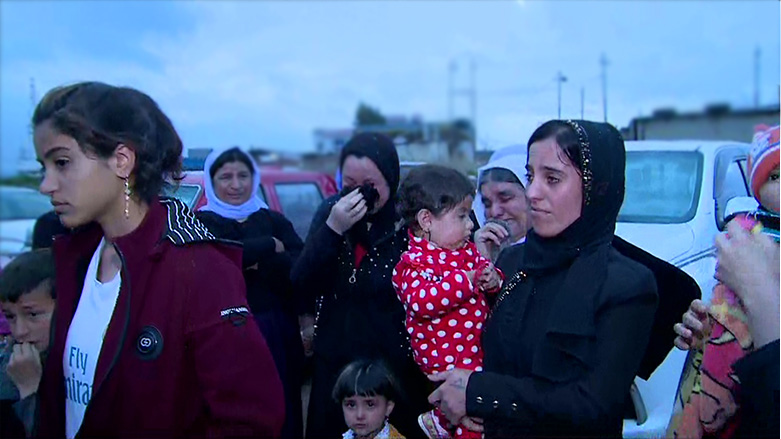Yezidis freed from ISIS in Syria have bittersweet reunion with families

ERBIL (Kurdistan 24) – Recently freed from years of captivity under the Islamic State, twenty-one Yezidis (Ezidis) on Monday finally reunited with their families as members of the ethnoreligious minority still await word of other relatives they believed are alive.
The group of 21—made up of 15 women and six children—were captives of the terrorist organization in its final enclave of Baghouz in eastern Syria on the banks of the Euphrates, near the Iraqi border.
Last week, amid an ongoing fight with the last remnants of the Islamic State, the US-backed Syrian Democratic Forces (SDF) secured passage of escape out of Baghouz for the Ezidis, and, through its dedicated office, facilitated their return to Iraq.
On Saturday, Iraqi border security forces received the group at a crossing in Sinjar (Shingal), where the Ezidis make up a majority. Two days after this, they reconnected with their family south of Sihela Village, located near the Syrian border, approximately 58 kilometers west of the city of Duhok.

In a bittersweet setting, tearful mothers and siblings embraced their relatives for the first time since they were taken five years ago. Though grateful for the return of some, mothers still grieved as a number of their children are yet to return or be heard of despite the Islamic State’s complete territorial collapse in Syria.
A number of survivors are suspected of being at the SDF–run al-Hol and Baghouz camps. Complications arise with authorities having trouble gauging whether liberated hostages and civilians belonging to the minority group, while other young ones are incapable of identifying relatives as they were extremely young when kidnapped by the Islamic State.

The Kurdistan Region’s Ezidi Rescue Office, along with Ezidi authorities in Shingal, are expected to partake in a search operation through said camps to help locate missing individuals and reunite them with their families.
The emergence of the Islamic State and its violent assault on Shingal led to the displacement of hundreds of thousands of members of the Ezidi community, who were considered by the terrorist group to be heretics. Most of them fled to the Kurdistan Region, while others resettled in neighboring countries in the region or Western states.
Others were not as lucky and remained stranded in the war zone, where they experienced atrocities and mass executions at the hands of the extremist group for years. The terrorists subjected women and girls to sexual slavery, kidnapped children, forced religious conversions, executed scores of men, and abused, sold, and trafficked women across areas they controlled in Iraq and Syria.
As of now, about 3,423 Ezidis have been rescued—as per new official numbers—from an estimated total of 6,417 kidnapped or otherwise missing, according to the Kurdistan Region’s office in charge of their rescue and repatriation.
The United Nations announced on Friday that the unearthing of the first mass grave filled with Ezidis killed by the Islamic State had been completed in a village in Shingal, the first step in what many hope will be further recognition for the genocide committed against the minority group.
Editing by Nadia Riva
(Additional reporting by Kurdistan 24 correspondent in Sinjar Maher Shingali)
